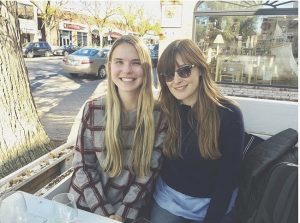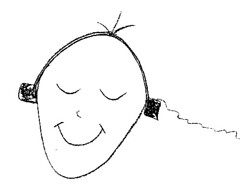Kristi Kaeppel & Emma Björngard-Basayne consider how podcasts can point the way to better teaching and learning:
At various points in the last few years, a captivating, slightly unnerving, and we suspect not unique thought has gripped us: a great deal of our learning happens via podcasts. We say unnerving considering the effort, time, and money spent on formal education, only to realize that this considerably less costly way of informal learning ranks right up there alongside our years of formal schooling (although no, podcasts have not helped us with the tedious, taxing task of improving our writing or research skills. There are limits to what they can do, alas!).
One of the reasons we suspect that podcasts have been so effective in our learning is because of the way they simultaneously inform and delight in ways that instructors often aspire to. That got us thinking about the ways that podcasts can inform our pedagogy. What is it about podcasts that draw the audience in to make meaning and retain the information presented within, that get us excitedly sharing their insights with our friends, and how might we borrow some of their lessons in our own teaching?
Storytelling:
Humans are storytelling creatures who long for narratives that explain events and discrete bits of information. Research has shown that stories facilitate better understanding and retention of a speaker’s points (Zak, 2014). Many podcasts effectively use storytelling to hook a reader, as in the podcast Hidden Brain, which discusses the mental processes that shape our behavior. Before getting into the research that is the spine of the show, the podcast opens with a story of real person, as in the case of the episode “Rap on Trial” that looks at how public perception shapes our judgments. It begins with the story of a rapper arrested on terrorist charges.
This got us thinking about how we can draw our students in with a quick anecdote or story that relates to the topic. One of Kristi’s most powerful classes happened when her students were studying the fourth amendment. On its own, this topic didn’t awaken curiosity and engagement. When a student chimed in and told the story of how the police came to her house searching for her father, a heated, emotional discussion ensued about whether this was a violation of the 4th amendment. Her students won’t be forgetting that amendment any time soon!
Stories can also help facilitate discussion of difficult topics. For instance, Emma usually assigns her students podcast episodes for her Gender & Philosophy course not only to add more context to some of the topics being discussed during lecture, but also to provide the students with opportunities to speak more freely on sensitive topics. For instance, when discussing topics such as Gender Essentialism and Double Standards, Abortion, and Vulnerability by Marriage, it is beneficial to be able to have students engage with other individuals’ stories and experiences rather than feeling forced to draw from their own lives. When students can use stories that they received through podcasts, it decreases their nervousness about potentially being judged by their classmates or feeling attacked by someone’s response to what they shared.
Authenticity and Vulnerability:
Discussing Marc Maron’s WTF podcast, Brian Casel writes, “Marc Maron’s WTF podcast is one of the most successful out there. Why? Because his brand of comedy is all about his raw, introspective honesty. Listening to WTF, I get to hear about all the insecurities, failures, triumphs, and emotions that a professional comic goes through.” Call it sadistic, but we like to hear stories of other people’s failures and mishaps. We happen to see it not as schadenfreude, but as a way to relate and feel connected with others who can so often seem better adjusted and more successful than us. This is particularly true in the way our students view us–experts in our fields who couldn’t possibly relate to struggling with the subject material. By sharing our own doubts and fears, we allow others to do the same and relax in class, relieving anxiety that interferes with learning.
Experiments:
Ira Glass, the renowned host of This American Life, said: “We view the show as an experiment. We try things. There was the show where we taped for 24 hours in an all-night restaurant. And the show where we put a band together from musicians’ classified ads. And the show where every story had been pitched by our own parents, who — wonderful as they are — are not very talented at spotting good radio stories.”
Despite the wacky experiments, the show is one of the most popular, longstanding podcasts out there. Without experimentation, there is no chance of innovation and improvement, and just like Glass and crew, instructors have to be willing to let go of some control and try something new. It may work and it may not. But that’s okay. Be transparent with your students and let me them know you’re trying a new approach. Even failed experiments give us valuable knowledge.
Simplicity:
Podcasts do a great job of breaking down concepts in a simple way, a skill that the best professors have mastered. As an example, when Emma was working on her dissertation she was tasked with making sense of Neuroscientist and Psychologist Lisa Feldman Barrett’s constructed theory of emotions, something which she struggled with greatly. However, one day as she was listening to one of her favorite podcasts, NPR’s Invisibilia, an interview with Feldman Barrett on her emotion work was published. Hearing Feldman Barrett herself explaining her theory, together with the hosts’ reflection on what she was saying, gave Emma a different perspective to approach the text from and suddenly it made more sense. Although an anecdotal experience, we have come to think of podcast episodes like this one as a way to provide students with alternative ways to take in and understand complex ideas.
Relevance:
In reviewing the best podcasts of 2017, The Atlantic writers Laura Jade Standley and Eric McQuade wrote that the podcast world, like any other sphere, is about what have you done for me lately.” Whether we are listening to stories of heartbreak on Modern Love, taking in an interview on Ezra Klein’s show about what Buddhism got right about the brain, or listening to life questions asked on Slate’s Dear Prudence podcast, we are doing so because we want to relate the concepts to our life or those around us. Stories of heartbreak might reveal something about the way we navigate relationships and how to avoid pitfalls. Buddhism and the brain might help us to learn ways to quiet the incessant anxiety that accompanies modern life through meditation practices. Answers to others individuals’ questions regarding how to respond to inappropriate comments from colleagues or friends, such as “what do I do when so-and-so refuses to use my preferred pronouns?” might teach us something about respecting others’ identities.
How can you frame your lessons and material to be relevant to students’ lives? We believe that with a little creativity, most of the concepts we cover can have relevance. It is a matter of connecting the ideas. Even when the relevance may seem obvious to us, it may not be to students.
Not every part of our classes can be as engaging and enthralling as a podcast. Skill-building, in particular, takes time and effort that is not always glorious or fun. Podcasts also aren’t typically made multiple times a week with limited time and a crew of one, as our classes are. Nevertheless, their popularity (a recent joke on Twitter goes that friends starting a podcast is the millennial version of “wanna start a band?”) and their ability to teach their audience shows they are doing something right and worth emulating.
This post was originally published on the UConn teaching blog website (University of Connecticut)
 Emma Björngard-Basayne, PhD recently received her doctoral degree in Philosophy at UConn, while Kristi Kaeppel is a current PhD student in Adult Learning. They’ve worked as instructors and advisors in HE, and they share a dedication to inclusive educational environments. Recent work focuses on the role of women’s friendships in navigating male-dominated work environments.
Emma Björngard-Basayne, PhD recently received her doctoral degree in Philosophy at UConn, while Kristi Kaeppel is a current PhD student in Adult Learning. They’ve worked as instructors and advisors in HE, and they share a dedication to inclusive educational environments. Recent work focuses on the role of women’s friendships in navigating male-dominated work environments.
Picture at top of this post : “Podcast listen” by Terry Freedman. It is licensed under CC BY-NC-ND 2.0
Tags: Pedagogy, Podcasts, Teaching and learning


Subscribe with…